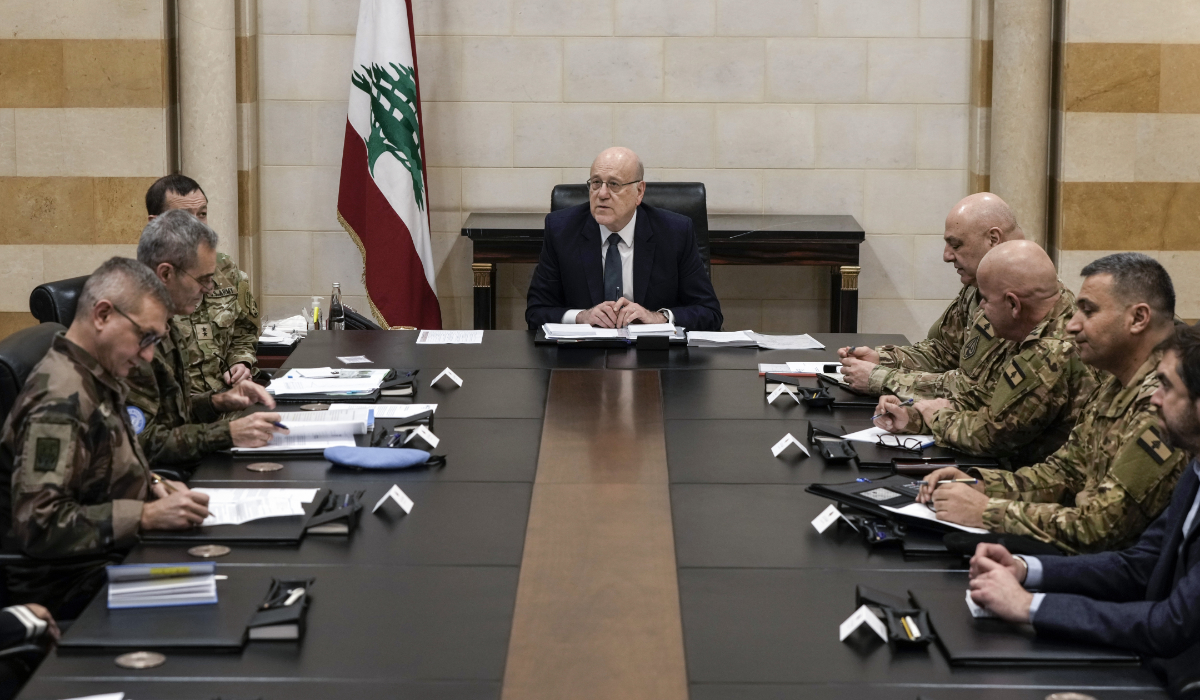BEIRUT: Israeli warplanes launched airstrikes on Friday targeting the outskirts of Qousaya in the eastern mountain range separating Lebanon from Syria.
The strikes hit three sites, with the Israeli military claiming Hezbollah was “using a crossing in the town of Janta to transfer military equipment through Syria.”
These areas, which include illegal crossings where Lebanese and Syrian territory overlap, had turned into closed security zones used by militants from Palestinian factions loyal to Syria, as well as Hezbollah. Tunnels were located earlier this week in the areas linking Lebanon and Syria.

Prime Minister Najib Mikati’s press office denied reports that Israel has informed Lebanon it will not withdraw from invaded areas after the expiry of the truce. (AP/AFP)
Israeli Air Force Commander Gen. Tomer Bar said: “Seven border crossings between Lebanon and Syria were attacked this morning following attempts to smuggle military equipment.”
Israeli military spokesperson Avichay Adraee said on social media that “the airstrikes targeted infrastructure at the Janta crossing, which was used to transfer military equipment through Syria to the terrorist organization Hezbollah.”
As part of what the Israeli army claims is the pursuit of Hezbollah weapons caches, Israeli aircraft also struck early Wednesday morning in the plain of Taraiyya, west of Baalbek, targeting an uninhabited house and a garage owned by an individual from the Hamieh family.
HIGHLIGHT
The strikes hit three sites, with the Israeli military claiming Hezbollah was ‘using a crossing in the town of Janta to transfer military equipment through Syria.’
Meanwhile, Israeli operations continue in the southern border region of Lebanon despite the ceasefire agreement with Hezbollah.
On Friday, the body of 75-year-old Najwa Ghasham was found in her home in the border town of Yaroun. Ghasham had refused to evacuate and insisted on staying throughout the hostilities, surviving until after the ceasefire took effect on Nov. 27.
The National News Agency reported that the Lebanese Red Cross retrieved her body, and after examination, it was revealed that she had been shot multiple times.
The Israeli newspaper Haaretz reported on Thursday that the Israeli military “killed 44 Hezbollah members who violated the ceasefire within 30 days after it took effect and carried out 25 attacks on Lebanese sites during this period.”
Israeli forces continue to target houses and sweep villages in southern Lebanon. Dwellings and roads continue to be bulldozed, as part of efforts to create a buffer zone, with residents and Hezbollah members denied entry.
Israeli forces hit the outskirts of Aita Al-Shaab with artillery shells on Friday.
Contact was lost with two Syrian workers identified as Taher Rimi and Ahmed Amin from Wadi Al-Hujair, following the withdrawal of the Israeli military on Thursday from the area, which was invaded for a few hours. According to security investigations, the missing workers might have been kidnapped by Israel.
A joint patrol of the Lebanese Armed Forces and a UNIFIL Indonesian unit inspected the areas infiltrated by the Israeli forces in Wadi Al-Hujair, Qantara, Adchit, Qsayr and the outskirts of Wadi Al-Salouqi toward Houla. The patrol removed dirt mounds erected by the Israeli forces in the middle of the road.
Caretaker Prime Minister Najib Mikati’s press office denied on Friday reports claiming that Israel has informed Lebanon through intermediates that it will not withdraw from invaded areas in the south after the expiry of the 60-day truce.
In a statement, Mikati’s office said: “These reports are totally untrue. The firm position that Mikati relayed to all the concerned sides, particularly the US and France, which are sponsoring the ceasefire agreement, underlines the necessity to pressure the Israeli enemy to withdraw from invaded Lebanese territories and cease its violations and hostilities.”
The statement continued: “Mikati reiterated this position in the intensive diplomatic and military contacts he held yesterday to push for the withdrawal of the enemy from Qantara, Adchit, Qsayr and Wadi Al-Hojair in southern Lebanon.
“He also relayed this position to the representatives of Washington and Paris in the five-member security committee overseeing the ceasefire agreement, during the meeting last Tuesday. Moreover, Mikati called for the full withdrawal of the Israeli enemy, stressing that the army carrying out its duty in its deployment areas started to consolidate its presence in the south in accordance with the agreement.”
The General Directorate of State Security announced that “a patrol from Akkar’s state security regional directorate arrested in the morning a person, whose identity was not revealed, considered a key driver of arms smuggling operations between Syria and Lebanon through illegal crossings in Lebanon’s northern border.”
The general directorate added that after searching his house, it found and seized “25 Kalashnikov rifles, one PKM machine gun, and ammunition.”
In other news, the Lebanese judiciary ordered the arrest of the wife and daughter of former Syrian ruler Bashar Assad’s cousin, Duraid Assad, at Beirut’s Rafik Hariri International Airport for possessing fake passports.
A judicial source clarified that “the Public Prosecution Office took the arrest decision due to the fake passports, while Duraid Assad (the son of former Syrian Vice President Rifaat Assad), who holds an authentic Syrian passport, was not arrested.”
The trio were heading to Cairo from Beirut, the source added.



























